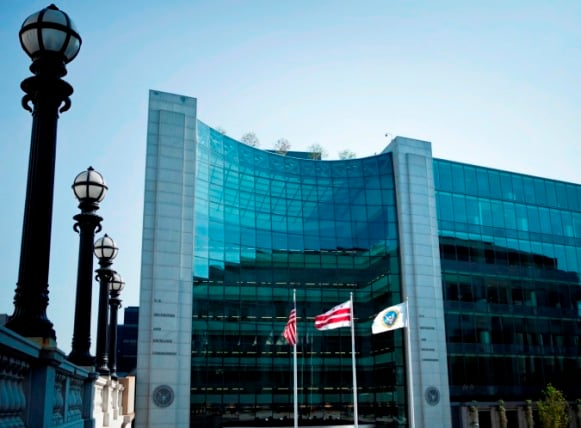In the give-and-take of congressional budget negotiations, the Securities and Exchange Commission got a little more funding than expected — but not nearly as much as it says it needs to perform its core functions while implementing the Dodd-Frank financial reform law.
In the give-and-take of congressional budget negotiations, the Securities and Exchange Commission got a little more funding than expected — but not nearly as much as it says it needs to perform its core functions while implementing the Dodd-Frank financial reform law.
In the budget agreement finalized late Friday night that prevented a government shutdown, the SEC is slated to receive a $74 million increase to its current budget for the rest of the fiscal year, which ends Sept. 30. The details of the so-called continuing resolution were released Tuesday by the Senate Appropriations Committee.
The modest bump to its $1.12 billion budget puts the agency in better shape than the original House Republican bill for fiscal 2011, known as HR 1, which would have cut the SEC budget by $48 million while reducing overall current spending by $61 billion.
House, Senate and White House negotiators worked late into the night Friday to forge a budget agreement that would cut $37.6 billion from current spending, or $78.5 billion from President Barack Obama's fiscal 2011 spending proposal.
The House and Senate are scheduled to vote on the budget measure this week.
Had lawmakers ailed to settle on a budget, the federal government would have shut down Saturday, forcing the SEC to suspend many operations, including investment adviser registration and examinations.
Until Friday, the government had been operating on a series of short-term funding measures since last October that forced agencies to operate on fiscal 2010 funding levels.
Each side is claiming victory in the final fiscal 2011 budget. In a summary of the continuing resolution, the House Appropriations Committee Republicans touted the fact that the nearly $38 billion reduction is the “largest non-defense spending cut in the history of our nation.”
Senate Democrats, however, point to the SEC funding increase as one of the victories that Democrats achieved by rejecting “the Draconian cuts” contained in the original House Republican bill.
“The HR 1 cut would have severely hampered the SEC's ability to police the markets and enforce securities laws, and would have constrained the SEC's efforts to improve its technology to police highly sophisticated market participants who currently trade at almost the speed of light and spend billions each year on their own IT infrastructures,” the Democratic-majority Senate Appropriations Committee said Tuesday in a summary of the spending bill. “The [continuing resolution] level will help address these shortcomings.”
An SEC spokesman declined to comment on the funding measure.
The $74 million boost over its fiscal 2010 budget falls far short of what the SEC was hoping to receive. Under Mr. Obama's fiscal 2011 budget request, the agency's funding would have increased to $1.258 billion, from $1.12 billion.
More funding challenges await the agency in fiscal 2012, which starts Oct. 1. A Republican budget resolution calls for an SEC budget of $906 million, a cut of $212 million from fiscal 2010 and $501 million less than Mr. Obama is proposing for the agency in 2012.
Stephen Crimmins, a partner at K&L Gates LLP, said that Congress is not recognizing that the SEC does not use tax dollars to fund its operations and has “zero impact on the budget.” The SEC collected $1.5 billion in fees last year, exceeding its $1.12 billion congressional appropriation.
The Dodd-Frank financial reform law promised to double the SEC budget by 2015 in order to satisfying the new demands the measure places on the agency. But those increases are subject to congressional approval, which looks as if it will consistently be hard to obtain.
The Republican majority in the House and its strengthened minority in the Senate are skeptical about the SEC's pleas for more money. GOP lawmakers criticize the SEC for failing to catch Bernie Madoff before he bilked investors of $50 billion in his Ponzi scheme.
They contend that the agency should be pared back along with the rest of the federal budget and should improve its effectiveness and efficiency before receiving more money.
Mr. Crimmins, however, said that this is the wrong time to deny funding to the SEC.
“In the wake of the worst financial crash in 80 years and in the midst of radically more complex products and trading than ever before imagined, it's high time to let the SEC use the available Wall Street money it needs to do its job — specifically the $1.3 billion for fiscal 2011 and the $1.5 billion for fiscal 2012 that were promised just last summer in Dodd-Frank,” Mr. Crimmins, former deputy chief litigation counsel in the SEC's Division of Enforcement, wrote in an e-mail.
In an April 8 speech to business journalists in Dallas, SEC Chairman Mary Schapiro said that budget constraints are hampering the agency's ability to ensure market integrity. She said that hiring has been curbed, IT initiatives canceled and enforcement procedures scaled back.
“Insufficient funding for the SEC means an investor protection effort hobbled at a time when the events of the last decade have proved that effective enforcement of the securities laws is more important than ever,” Ms. Schapiro said.







